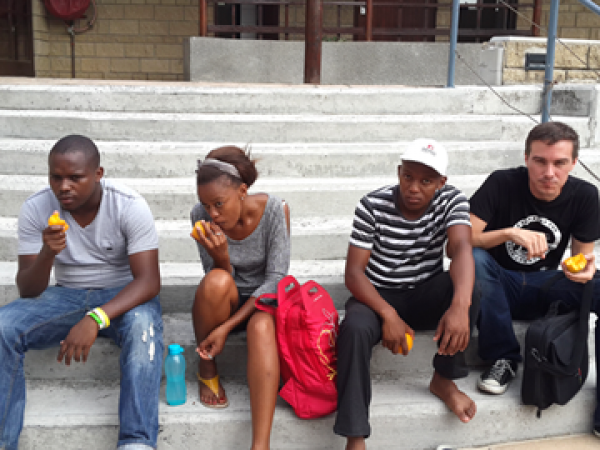

Taking a break from the heat at the inquiry. Sifiso Zitwana, Nokubonga Yawa, Nkosikhona Swartbooi and Craig Oosthuizen. Photo by Adam Armstrong.
18 February 2014
Brigadier Zithulele Moses Dladla dealt with only three murders the last year he was stationed at Wynberg Police Station. When he was subsequently transferred to Khayelitsha Police Station, he saw four murders in his first weekend.
The Brigadier gave testimony at the Khayelitsha inquiry into policing yesterday.
The inquiry heard last week about the Resource Allocation Guide (RAG). This is the document that indicates what resources a station should receive. For example, it specifies the number of officers and vehicles. This document is not decided at the station level. Worryingly, Colonel Reitz, the Station Commander of Lingelethu West who testified on Friday, did not know how his RAG had been developed or what the decisions were that informed his RAG.
Brigadier Dladla spoke negatively about the RAG, stating that the officers in Khayelitsha are overburdened. “In the movies, or on channel 171 [of DSTV], you see a team of detectives descending on a murder or a crime scene. Here [in Khayelitsha], you have a team of dockets descending on one detective… we need more detectives.”
“On channel 171 [of DSTV], you see a team of detectives descending on a murder or a crime scene. Here [in Khayelitsha], you have a team of dockets descending on one detective.”
Speaking of the high number of dockets that detectives in Khayelitsha sit with. He said bluntly “you can’t manage 160 dockets”…“you can’t satisfy everyone with such a workload.”
There were 168 murders reported to the Khayelitsha Site B Police Station during the previous financial year. The Brigadier spoke passionately about reducing this. His goal for this year is to have fewer murders than last year. “One life saved, to me, is a lot.”
He also spoke about domestic violence and how SAPS responds to these crimes, “We have learnt, we have changed, we have grown.”
Dladla was frank in his evidence today. He is the only officer, so far, to speak negatively about broader aspects of SAPS, such as training, resource allocation or the lack of appropriate office space for his members. One member of the audience described him as “the first honest cop to speak at the inquiry.”
Over the past few days we have heard from Senior SAPS officers. This will continue until the end of the first phase of the inquiry.
Khanyisa Gxothani lives in Khayelitsha and has been watching the inquiry. She is not optimistic that the inquiry will lead to real changes in Khayelitsha. She described the senior SAPS officers as “living on another planet”… “They don’t view us as humans, they don’t care about us”. She said that when senior officers speak of people killed through police brutality [at Marikana and similar events], they don’t sound like they care, or even understand that these were human beings who were killed.

Zackie Achmat of Ndifuna Ukwazi and Brigadier Dladla share a warm moment during the lunch break at Lookout Hill. Photo by Adam Armstrong.
She also accused some of the Afrikaans officers of racism though she did not give examples. The belief that white Afrikaans officers are racist is held by a number of residents in Khayelitsha that GroundUp has spoken to.
Khanyisa spoke of how Detective Swart, who testified on Friday, initially did not want to be posted in Khayelitsha. There is a perception within SAPS that being posted to township police stations such as Khayelitsha is used as a punishment for officers who step out of line. For Khanyisa, and other residents of Khayelitsha, they believe that weaker officers are deployed to Khayelitsha.
Kanyisa said that throughout the Inquiry, SAPS have avoided taking responsibility. They often shift blame to other parties, such as the National Prosecuting Authority. They plan and implement operations, but they don’t seem to evaluate their actions, says Khanyisa.
SAPS officers will continue to give evidence all of this week, ending with Provincial Commissioner Arno Lamoer on Friday.